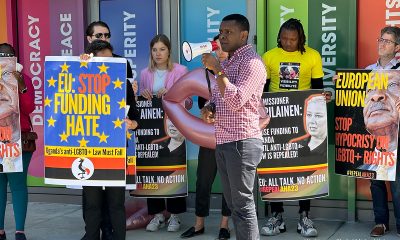National
Ohio couple ‘blown away’ by impact of marriage lawsuit
Obergefell, Arthur spent $13,500 for Md. marriage as terminal illness looms


James Obergefell (right) and John Arthur in happy times before Arthur was stricken with ALS (Photo courtesy of James Obergefell).
Two days after a judge issued a court order requiring his home state to recognize his marriage, James Obergefell is still blown away by the media attention he and his dying spouse, John Arthur, have received after they spent $13,500 to wed in Maryland and sue Ohio to recognize the union.
During an interview with the Washington Blade on Wednesday from his home in Cincinnati, Obergefell called the experience of flying to Maryland to marry his partner of 20 years, returning home to sue for marriage recognition and having the court order his state to recognize it “surreal and honestly, kind of hard to believe.”
“Just the reaction that we received worldwide was touching and amazing. But then for it to turn into this?” Obergefell said. “We’re blown away, we’re thrilled and happy to show the world that we’re people too. We’re just like your neighbors, just like your kids. All we want is exactly what you have.”
The story of Obergefell and Arthur, both 47, and their marriage went viral earlier this month. Obergefell married his spouse Arthur, who’s dying of amyotrophic lateral sclerosis (ALS,) also known as Lou Gehrig’s disease, on July 11.
Their friends and family donated about $13,500 for them to fly to Maryland on July 11 in a special jet equipped with medical equipment to serve Arthur’s needs. The couple married aboard the plane as it sat on the tarmac before returning to Cincinnati the next day.
After they sued the state of Ohio to recognize their marriage, U.S. District Judge Timothy Black issued a temporary restraining order on state officials, including Gov. John Kasich, requiring Ohio to recognize the union in Arthur’s remaining days. Arthur’s death certificate must denote that he’s legally married and Obergefell is his surviving spouse.

(Photo courtesy of James Obergefell)
Obergefell said he learned the judge put the order in place on Monday while at home with family — including with Arthur’s aunt, who married the couple in Maryland — after attending the hearing in which Black said he’d rule later that day. The news came from the couple’s lawyer via telephone.
“I got the call from our attorney, and he simply said, ‘We won!'” Obergefell said. “So then I got his email and I read the whole 15 pages, or most of them, to John and his aunt and his uncle after we jumped up and kissed and hugged and cried and all of that, then I just read through the document. And then, friends came over that night and we shared a bottle of Champagne.”
The judge’s decision to hand down a temporary restraining order even before he reached a final decision in the lawsuit was expected for Obergefell, who requested such action on Friday as part of the couple’s lawsuit. Still, when the order was handed down, Obergefell said the decision was “surprising, gratifying and just incredible.”
Evan Wolfson, president of Freedom to Marry, said in a statement the great lengths the couple went to marry demonstrates the commitment of their love as he criticized Ohio law because it “cruelly denies them the freedom to marry at home.” A state constitutional amendment passed by Ohio voters in 2004 prohibits same-sex marriage.
“No couple should be forced to leave home to make legal their love and commitment to each other, and as a federal court this week rightly affirmed, no couple should suffer the indignity of returning home only to be told, ‘Your marriage doesn’t matter here,'” Wolfson said.
The order, which expires on Aug. 5, may have come just in time for the couple. Obergefell said Arthur has good days and bad days, but his health continues to decline.
“He has lost even more ability to speak,” Obergefell said. “I mean, a sentence or two is about all he can manage. ALS is a horrible disease; it just doesn’t let up.”
It’s hard to say how much time remains for Arthur, but Obergefell continues to have a positive mindset.
“In my heart of hearts,” Obergefell said. “I want to say indefinitely, I want to say many months more, but I don’t know. I wake up everyday, and my day is all around, ‘Be here longer. Be here longer.”
The reason the couple filed the lawsuit and went to such lengths to marry was Arthur’s death certificate. After the couple married on July 11, their lawyer informed them that Arthur’s death certificate would not designate him as married, nor would it identify Obergefell as his surviving spouse.
“It ripped my heart out,” Obergefell said. “Hearing that was enough to say, OK. I can’t stand for that. I can’t let any other gay couple stand for that. It isn’t right.”
But the decision to file the lawsuit resulted not just from the issue of the death certificate or state recognition of their marriage, but the idea that their union should be treated equally under the law.
“So it’s not the only thing; it was just the lightbulb going off over your head that — I felt responsibility, not just to John, not just to our marriage, but other people,” Obergefell said. “So, it’s not just that. We need to be equal. Simply put.”
Gov. Kasich, who opposes same-sex marriage, has the option of filing to a higher court the restraining order put in place by Black. No word has come yet from the governor’s office on whether he’ll do so.
Obergefell has a singular message for Kasich: Stand back and allow the court ruling that enables the legal recognition of him and his dying spouse to stand.
“My message to him is Gov. Kasich, we are citizens of Ohio, we are asking for nothing more than the same rights, responsibilities and benefits that every other married couple in the state receives,” Obergefell said. “That’s it. Do the right thing, sit back, and allow us to be Ohioans and Americans.”
Obergefell said he chose Maryland as the place where he and Arthur would marry because obtaining the marriage license in the state requires the presence of only one person — not both parties in the relationship — and because of the limited 48-hour waiting period that must pass before a wedding. Obergefell traveled by himself to obtain the license, then the couple returned together for the ceremony at BWI airport.
During the trip, Obergefell said one thought was continuously running through his head: “I can’t believe this is happening; I can’t believe this is happening.”
“That was closely preceded by, ‘Oh my goodness, we have such wonderful friends and family who — without prompting — jumped up and said, ‘We will make this happen for you,'” Obergefell said. “We will help make this reality.”
But when asked how it felt to have to spend $13,500 to travel to another state to marry when opposite-sex couples can do the same thing at their local courts, Obergefell said he was “pissed.”
“We live blocks from the Hamilton County Courthouse,” Obergefell said. “It makes me angry that we couldn’t just go there. And you know, that would still be physically demanding on him, but that would be a matter of getting him into his power wheelchair and taking him a few blocks to appear in person, and then coming home.”
Grant Stancliff, a spokesperson for Equality Ohio, said the legal recognition of their marriage is “huge” and “brought Ohio couples who are legally married in other states a ray of hope.”
“This is one of the biggest steps that has ever been taken toward marriage equality in Ohio,” Stancliff said. “It is a fantastic ruling for Jim and John. They really deserve the dignity and respect they were shown by Judge Black. Of course, so do the rest of legally married Ohioans.”
And Obergefell has a message for gay couples seeking to marry, but who live in one of the 37 states without marriage equality: Don’t wait another moment to obtain the recognition you seek.
“We deserve it; we’re asking for nothing special,” Obergefell said. “If you have the energy, the will, the desire, if you’re thinking about it, do it. Getting married, in a way, nothing changed, being together 20 years, but, truly, everything changed. It’s impossible to describe, but everything changed getting married.”
State Department
State Department releases annual human rights report
Antony Blinken reiterates criticism of Uganda’s Anti-Homosexuality Act

Secretary of State Antony Blinken on Monday once again reiterated his criticism of Uganda’s Anti-Homosexuality Act upon release of the State Department’s annual human rights report.
“This year’s report also captures human rights abuses against members of vulnerable communities,” he told reporters. “In Afghanistan, the Taliban have limited work opportunities for women, shuttered institutions found educating girls, and increasing floggings for women and men accused of, quote, ‘immoral behavior,’ end quote. Uganda passed a draconian and discriminatory Anti-Homosexuality Act, threatening LGBTQI+ individuals with life imprisonment, even death, simply for being with the person they loved.”
Ugandan President Yoweri Museveni last May signed the law, which contains a death penalty provision for “aggravated homosexuality.”
The U.S. subsequently imposed visa restrictions on Ugandan officials and removed the country from a program that allows sub-Saharan African countries to trade duty-free with the U.S. The World Bank Group also announced the suspension of new loans to Uganda.
Uganda’s Constitutional Court earlier this month refused to “nullify the Anti-Homosexuality Act in its totality.” More than a dozen Ugandan LGBTQ activists have appealed the ruling.
Clare Byarugaba of Chapter Four Uganda, a Ugandan LGBTQ rights group, on Monday met with National Security Council Chief-of-Staff Curtis Ried. Jay Gilliam, the senior LGBTQI+ coordinator for the U.S. Agency for International Development, in February traveled to Uganda and met with LGBTQ activists who discussed the Anti-Homosexuality Act’s impact.
“LGBTQI+ activists reported police arrested numerous individuals on the basis of their sexual orientation or gender identity and subjected many to forced anal exams, a medically discredited practice with no evidentiary value that was considered a form of cruel, inhuman, and degrading treatment and could amount to torture,” reads the human rights report.
The report, among other things, also notes Ugandan human rights activists “reported numerous instances of state and non-state actor violence and harassment against LGBTQI+ persons and noted authorities did not adequately investigate the cases.”
Report highlights anti-LGBTQ crackdowns in Ghana, Hungary, Russia
Ghanaian lawmakers on Feb. 28 approved the Promotion of Proper Human Sexual Rights and Ghanaian Family Values Bill. The country’s president, Nana Akufo-Addo, has said he will not sign the measure until the Ghanaian Supreme Court rules on whether it is constitutional or not.
The human rights report notes “laws criminalizing consensual same-sex sexual conduct between adults” and “crimes involving violence or threats of violence targeting lesbian, gay, bisexual, transgender, queer or intersex persons” are among the “significant human rights issues” in Ghana.
The report documents Hungarian Prime Minister Viktor Orbán and members of his right-wing Fidesz party’s continued rhetoric against “gender ideology.” It also notes Russia’s ongoing crackdown against LGBTQ people that includes reports of “state actors committed violence against LGBTQI+ individuals based on their sexual orientation or gender identity, particularly in Chechnya.”
The report specifically notes Russian President Vladimir Putin on July 24 signed a law that bans “legal gender recognition, medical interventions aimed at changing the sex of a person, and gender-affirming care.” It also points out Papua New Guinea is among the countries in which consensual same-sex sexual relations remain criminalized.

The Cook Islands and Mauritius in decriminalized homosexuality in 2023.
The report notes the Namibia Supreme Court last May ruled the country must recognize same-sex marriages legally performed outside the country. The report also highlights the Indian Supreme Court’s ruling against marriage equality that it issued last October. (It later announced it would consider an appeal of the decision.)
Congress requires the State Department to release a human rights report each year.
The Biden-Harris administration in 2021 released a memorandum that committed the U.S. to promoting LGBTQ+ and intersex rights abroad.
The full report can be read here.
National
Same-sex couples vulnerable to adverse effects of climate change
Williams Institute report based on Census, federal agencies

A new report by the Williams Institute at the UCLA School of Law finds that same-sex couples are at greater risk of experiencing the adverse effects of climate change compared to different-sex couples.
LGBTQ people in same-sex couple households disproportionately live in coastal areas and cities and areas with poorer infrastructure and less access to resources, making them more vulnerable to climate hazards.
Using U.S. Census data and climate risk assessment data from NASA and the Federal Emergency Management Agency, researchers conducted a geographic analysis to assess the climate risk impacting same-sex couples. NASA’s risk assessment focuses on changes to meteorological patterns, infrastructure and built environment, and the presence of at-risk populations. FEMA’s assessment focuses on changes in the occurrence of severe weather events, accounting for at-risk populations, the availability of services, and access to resources.
Results show counties with a higher proportion of same-sex couples are, on average, at increased risk from environmental, infrastructure, and social vulnerabilities due to climate change.
“Given the disparate impact of climate change on LGBTQ populations, climate change policies, including disaster preparedness, response, and recovery plans, must address the specific needs and vulnerabilities facing LGBTQ people,” said study co-author Ari Shaw, senior fellow and director of international programs at the Williams Institute. “Policies should focus on mitigating discriminatory housing and urban development practices, making shelters safe spaces for LGBT people, and ensuring that relief aid reaches displaced LGBTQ individuals and families.”
“Factors underlying the geographic vulnerability are crucial to understanding why same-sex couples are threatened by climate change and whether the findings in our study apply to the broader LGBTQ population,” said study co-author Lindsay Mahowald, research data analyst at the Williams Institute. “More research is needed to examine how disparities in housing, employment, and health care among LGBT people compound the geographic vulnerabilities to climate change.”
Read the report
Federal Government
Lambda Legal praises Biden-Harris administration’s finalized Title IX regulations
New rules to take effect Aug. 1

The Biden-Harris administration’s revised Title IX policy “protects LGBTQ+ students from discrimination and other abuse,” Lambda Legal said in a statement praising the U.S. Department of Education’s issuance of the final rule on Friday.
Slated to take effect on Aug. 1, the new regulations constitute an expansion of the 1972 Title IX civil rights law, which prohibits sex-based discrimination in education programs that receive federal funding.
Pursuant to the U.S. Supreme Court’s ruling in the landmark 2020 Bostock v. Clayton County case, the department’s revised policy clarifies that discrimination on the basis of sexual orientation and gender identity constitutes sex-based discrimination as defined under the law.
“These regulations make it crystal clear that everyone can access schools that are safe, welcoming and that respect their rights,” Education Secretary Miguel Cardona said during a call with reporters on Thursday.
While the new rule does not provide guidance on whether schools must allow transgender students to play on sports teams corresponding with their gender identity to comply with Title IX, the question is addressed in a separate rule proposed by the agency in April.
The administration’s new policy also reverses some Trump-era Title IX rules governing how schools must respond to reports of sexual harassment and sexual assault, which were widely seen as imbalanced in favor of the accused.
Jennifer Klein, the director of the White House Gender Policy Council, said during Thursday’s call that the department sought to strike a balance with respect to these issues, “reaffirming our longstanding commitment to fundamental fairness.”
“We applaud the Biden administration’s action to rescind the legally unsound, cruel, and dangerous sexual harassment and assault rule of the previous administration,” Lambda Legal Nonbinary and Transgender Rights Project Director Sasha Buchert said in the group’s statement on Friday.
“Today’s rule instead appropriately underscores that Title IX’s civil rights protections clearly cover LGBTQ+ students, as well as survivors and pregnant and parenting students across race and gender identity,” she said. “Schools must be places where students can learn and thrive free of harassment, discrimination, and other abuse.”
-

 South America3 days ago
South America3 days agoDaniel Zamudio murderer’s parole request denied
-

 Maryland4 days ago
Maryland4 days agoMontgomery County police chief discusses arrest of trans student charged with planned school shooting
-

 Commentary4 days ago
Commentary4 days agoWorld ‘isn’t much different today’
-

 European Union5 days ago
European Union5 days agoActivists demand EU sanction Uganda over Anti-Homosexuality Act












